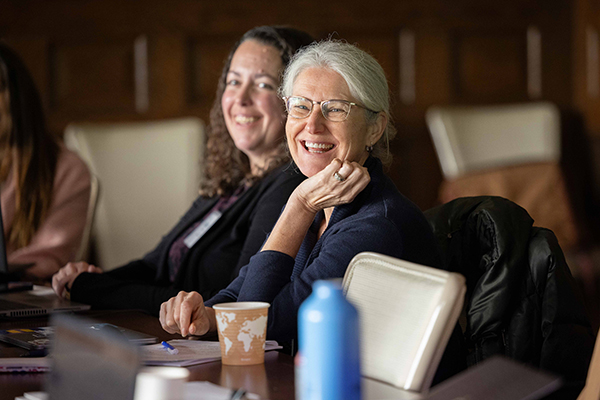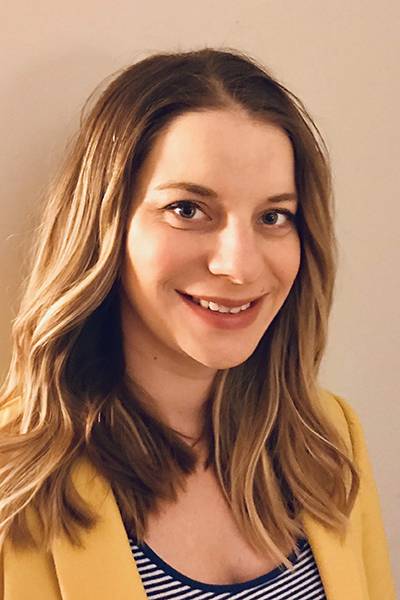
01/10/2025
SUNY Cortland Associate Professor Carrie Rood is among 11 educators selected across the SUNY system for a new fellowship focused on improving accessibility for the more than 10% of SUNY students who self-identify as having a disability.
SUNY Chancellor John B. King Jr. Thursday announced the educators picked for the yearlong SUNY Accessibility Advocates and Allies Faculty Fellowship Program, which was created to explore models and strategies to build and expand a culture of access across the largest comprehensive higher education system in the nation.

“There is a place at SUNY for every New Yorker, and we are committed to excellence and inclusivity across our 64 SUNY campuses,” King said. “The work of our inaugural Accessibility Fellows is crucial to ensuring our faculty have the support to consistently adopt inclusive teaching practices to guarantee student success and upward mobility.”
In the coming year, Rood and the other fellows will play an important role in helping SUNY campuses significantly enhance adaptations to allow fuller participation by students with disabilities who have made themselves known to their campus disability services or accessibility resources offices.
SUNY invests $10 million in annual recurring state funding to increase support to students with disabilities at all state-operated campuses.
“We know if we design things or create things for people with a disability in mind, we find that it often benefits others,” said Rood, an associate professor in the School of Education’s Foundations and Social Advocacy Department with a background in special education and accessibility in teaching.
“Universal design for learning … really asks us how we do that in the classroom,” Rood said. “How we design our materials, how we consider students and their backgrounds, how do we consider the goals of the course and how we share those goals with students.”
The 11 Accessibility Fellows met Jan. 8 and 9 to begin their work expanding digital accessibility and design practices across their campuses.
Through the end of 2025, the group will:
- Share their expertise and experience as they identify obstacles and work toward solutions to broaden adoption of accessibility practices
- Connect with other communities of practice and campus leaders with a shared vision, including disability and accessibility directors, electronic and information technology accessibility officers, chief diversity officers, chief information officers, teaching center directors, directors of online learning, the SUNY Faculty Advisory Council on Teaching and Technology members and instructional designers
- Grow as faculty leaders as they coordinate with campus leadership to design and execute a plan to engage their campus community in their work
The program is co-sponsored by the SUNY Office of Student Success in partnership with the Office of the Provost and supported by the Universal Design for Learning at SUNY project. SUNY Oswego Professor and Associate Dean Rebecca Mushtare is facilitating the fellowship project.
Rood, in her ninth year on the faculty and as the new director of the Cortland’s Urban Recruitment of Educators (C.U.R.E.) program, has an expansive philosophy about universal educational access. Curb cuts, elevators and push buttons to open doors are examples of this theory in practice.
In her own classroom, Rood has developed a process for her students to support multiple and flexible points for accessing course content. For example she uses a shared online notebook, where students take turns submitting typed or handwritten class notes.
“So, if a student is absent, they can go back and read the class notes,” Rood said. “Or if a student prefers to listen to the lesson first and then go back and look at the notes, they can do that. That’s the crux of universal design for learning. It creates different access points, both for those with documented accommodations and others, for example, if a student is absent because a family member passed away.”
“(Rood) makes excellent use of technology to enable students to learn course content in multiple ways and also allows for students to demonstrate their learning through various modalities,” said Andrea Lachance, dean of SUNY Cortland’s School of Education.
Anne Burns Thomas, professor and chair of the Foundations and Social Advocacy Department, echoed that support.
“She will bring needed change to the SUNY Cortland community and will be an excellent collaborator for others across the SUNY system who are beginning this important work,” Burns Thomas said.
Rood graduated from LeMoyne College with a degree in history and a concentration in adolescent history education and special education. She later studied at Syracuse University and earned a master’s degree, a certificate of advanced studies (C.A.S.) in disability studies, and a doctorate in special education with a focus on disability studies and inclusive education. Rood taught special education classes at public schools in Syracuse and Fulton.
She has served on many key committees involved in researching and designing solutions to inclusion for marginalized students, including the Faculty Committee on Inclusive Practice, the President’s Council of Inclusive Excellence, the Disability Resources Committee, the Inclusive Education Club and various disability interest groups and the Academic Advising Committee.
Beyond the 10%, Rood is aware that many of her students will never self-identify to a student disability office, either because they do not know they are eligible or have chosen not to disclose due to a wide variety of reasons, including stigma, which is why it’s important to include everyone.
“The goal is to embrace those parts of their identity that make up who they are,” she said.
Select an image below to view the image gallery.





